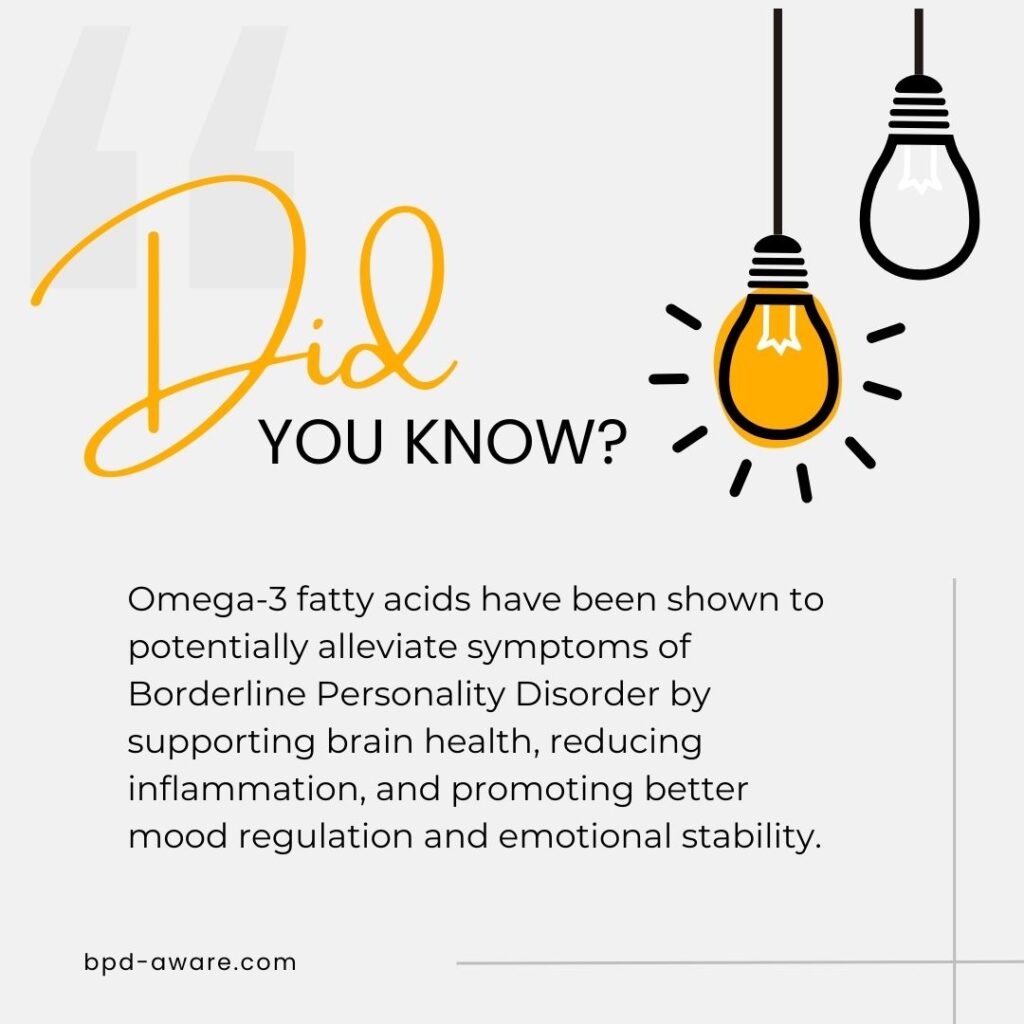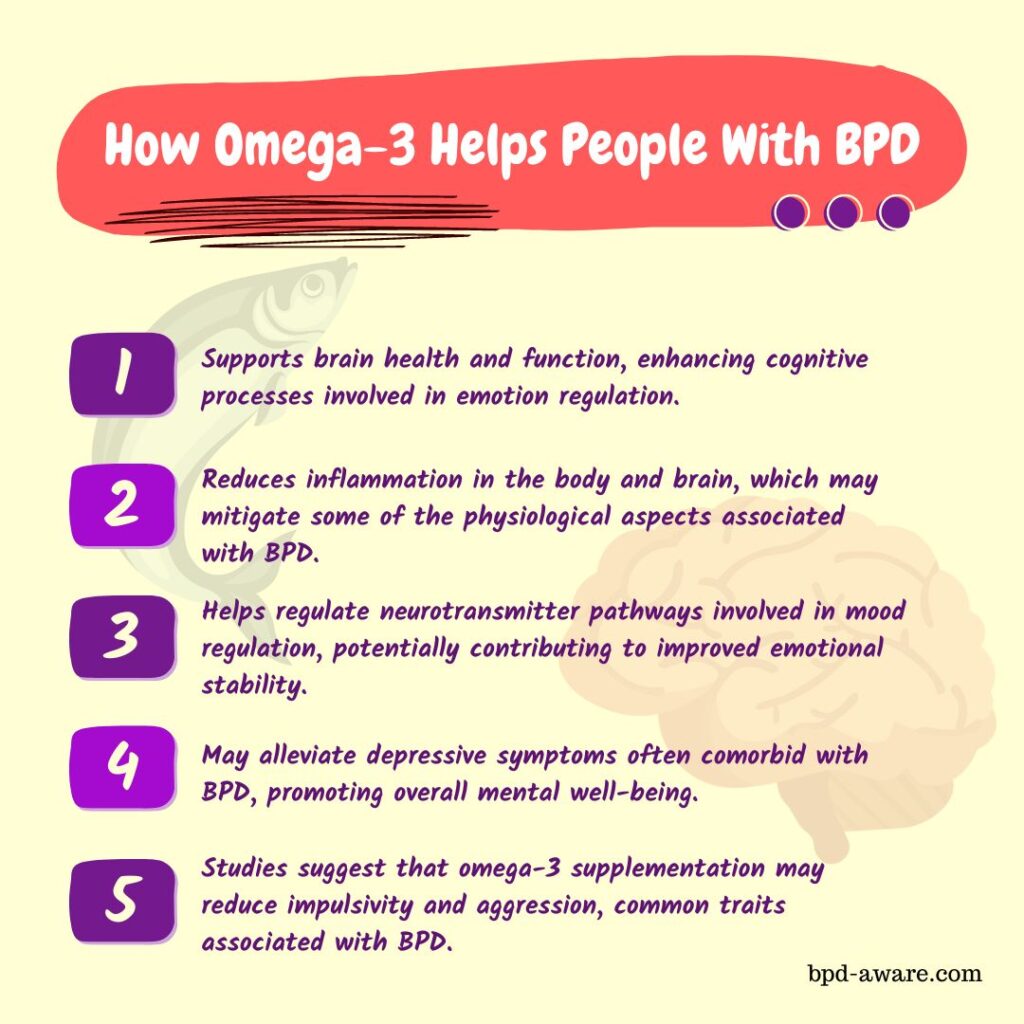There are a growing number of treatments and medications that exist to treat Borderline Personality Disorder (BPD), but one of the most surprising medications is one that anyone can buy is a supplement from their nearest supermarket, health food store, or pharmacy. You can even buy it online and, best of all, it’s not expensive.
The supplement I’m talking about is omega-3.
Fish oil has been shown to improve symptoms of BPD in several recent studies. Researchers have noted that people with BPD who take omega-3 show marked reductions in impulsive behavior, emotional regulation, depression, and suicidal tendencies.
Let’s look at what exactly omega-3 is, what it does, how it helps those of us with BPD, the best sources of omega-3, and the amount to take.
What is Omega-3 and What Does It Do?
Omega-3 is a type of polyunsaturated fat that is essential for human health, especially the health of the brain. Omega-3 is considered essential because we aren’t capable of producing it on our own the way we can with something like Vitamin D. Our bodies are capable of producing Vitamin D by spending time in the sun. However, the only way to get omega-3 into our bodies is through our diet or supplementation.
Omega-3 can be split into three types: Alpha-linolenic acid (ALA), Eicosapentaenoic acid (EPA), and Docosahexaenoic acid (DHA).
ALA: ALA has been found to improve heart health, brain functions, skin repair, and lower inflammation. However, its main purpose is to be converted to EPA or DHA. The process isn’t efficient though, which is why most fish oil supplements only contain EPA and DHA.
EPA: EPA plays a crucial role in various bodily functions, including reducing inflammation, supporting heart health, and promoting brain function.
DHA: DHA is a major structural component of the brain, retina, and other parts of the nervous system. This makes it essential for cognitive function, vision, and overall neurological health.
There is also omega-6. Omega-6 is also essential but it fights with omega-3 over the same enzymes which convert the oils into various active forms. Humans once consumed omega-3 and omega-6 at a similar rate, which is believed to be optimum for health. However, the modern Western diet sees many of us consuming ten times more omega-6 than omega-3, sending many important functions out of balance. This is why we need to focus on consuming more omega-3, to improve the balance.

How Does Omega-3 Help BPD?
Now we know the benefits of omega-3 fish oil, it’s time to focus on how it specifically helps those of us with Borderline Personality Disorder. While we don’t yet know for sure why omega-3 is so beneficial for people with BPD, we can make educated guesses based on its benefits.
Anti-inflammatory: Omega-3 helps to reduce inflammation all over the body. This helps reduce aches and pains which can exacerbate symptoms of BPD. More importantly, though, it also reduces inflammation in the brain. Such inflammation has been implicated in several mental health disorders.
Brain function and structure: EPA and DHA are essential components of brain cell membranes that are involved in neurotransmission and synaptic function. Some studies suggest that people with BPD have alterations in brain structure and function. This means that it’s vital to support brain health and neurotransmitter function so that the brain can repair and heal itself.
Cognitive functions: Difficulties with executive functions and impulse control are common in individuals with BPD. Omega-3 has been shown to help improve cognitive functions such as these. Not only does that produce a direct improvement for those with BPD, but improved cognitive functions have a knock-on effect too. When you’re able to think and act more clearly, life tends to go more smoothly, creating less stress.
Mood regulation: People with BPD often experience intense mood swings and emotional dysregulation. The EPA type of Omega-3 has been found to act as a kind of mood stabilizer. It helps regulate the production of serotonin and dopamine, which play crucial roles in mood regulation.
Stress reduction: Omega-3 fatty acids help to modulate the body’s stress response systems, including the release of stress hormones like cortisol. By reducing the physical response to stress, omega-3 fatty acids may help individuals with BPD better cope with stressful situations.

What Contains Omega-3?
There are five major sources of omega-3. Fatty fish such as salmon, herring, mackerel, sardines, trout, anchovies, and tuna; shellfish like shrimp, crab, lobster, and oysters; plant sources such as chia seeds, flax seeds, (and flaxseed oil), hemp seed (and hemp seed oil), walnuts, soybeans, edamame, canola oil, brussels sprouts, kale, and spinach; algae-based supplements; and fish oil supplements.
How Much Should I Take?
There are no official recommendations for the maximum amount of omega-3 you can take, but it’s recommended to aim for between 1,200mg to 3,000mg per day. Any higher than this and you run the risk of using up the body’s supply of antioxidants.
It can take quite some time for the positive benefits to begin to show though. Your levels of omega-3 should begin to rise quite quickly if you take a supplement and add more omega-3-rich foods to your diet. However, the repairs your brain and body need to make do take time – as long as six months. But you may begin to feel some benefits within as little as six weeks.
Final Thoughts
There is growing evidence that omega-3 can help reduce the symptoms of BPD. While it’s not a cure or a replacement for therapy (as well as other medications), omega-3 can be a vital tool in making life better for people with BPD.
By improving brain functions, neurochemical production, cognitive functions, mood regulation, and stress reduction, life becomes a little easier. When life becomes easier, it’s easier to focus on recovery rather than struggling to just survive each day.
There are no reported side-effects caused by taking a moderate amount of omega-3 so it’s seen as a low-risk, high-reward prospect in regards to treating BPD.
I take an omega-3 supplement and have increased the amount of omega-3-rich foods in my diet over the last year and have found that my cognitive functions have improved as a result. I now no longer suffer from brain fog, which used to be a common occurrence for me.
So, if you’re looking for something to add to your daily routine that can help you overcome BPD, why not give an omega-3 supplement a try?
Sources, Resources, and Further Reading
- Effectiveness of Omega-3 polyunsaturated fatty acids reducing severe symptoms in patients diagnosed with Borderline Personality Disorder (BPD): https://pmc.ncbi.nlm.nih.gov/articles/PMC10434080/
- Marine Omega-3 Fatty Acid Supplementation for Borderline Personality Disorder: A Meta-Analysis: https://pubmed.ncbi.nlm.nih.gov/34004088/
- Omega 3 is life changing – https://www.reddit.com/r/BPD/comments/10ugxt3/omega_3s_life_changing/
- Borderline Personality Disorder and Omega-3 Fatty Acids: https://www.psychiatryredefined.org/borderline-personality-disorder-and-omega-3-fatty-acids/
















